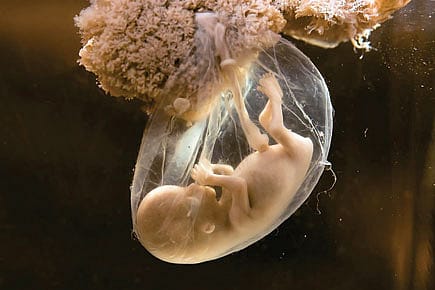The First Few Hours of Life

How a wave of calcium prevents cell division in the embryo from degenerating into chaos
We are only now learning some of the complexities of how fertilised cells develop in the first few hours after conception. According to work published by a team led by Princeton Professor Ned Wingreen in PLoS Computational Biology, newly fertilised cells barely avoid degenerating into fatal chaos. According to a university press release, 'Scientists have discovered that embryos have acquired a mechanism to contain this dangerous instability. This lurking state of disorder was revealed through computational models [that] researchers constructed of the embryo cell cycle. The cell cycle is the repeated division and duplication of cells that transforms a single fertilized egg into a full-grown organism. Scientists already knew that embryonic cell cycles are initiated by a swift wave of calcium that emanates from the fertilization site and prompts the embryo's cells to divide and duplicate—or oscillate, in biological terms.'
Their simulation has produced the first indication that the fast-moving calcium wave known to spark cell division doubles as a synchroniser that sets cells to the same developmental timetable. The finding reveals a crucial role for the somewhat puzzling existence of the calcium wave, as well as a new level of sophistication in how embryos function. "We didn't have to go searching for chaos, it just came right out at us," Wingreen said. "When the dust settled, it became clear that cell-cycle oscillation, while remarkably uniform in the end, does not come by that harmony on its own, especially not in anything as big as an embryo, which is much larger than a typical cell. But then the question became, if there's this potential for chaos, how does the system avoid it? It turns out that the system needs the calcium wave to avoid chaos and that wave is activated surprisingly fast." The embryo's need for stabilisation and the dual role of the calcium wave illuminates the intricacy of developing embryos, as well as the impressive ability of embryos to prevent their own destruction, according to James Ferrell, a Stanford University professor of chemical and systems biology.
Imran Khan: Pakistan’s Prisoner
27 Feb 2026 - Vol 04 | Issue 60
The descent and despair of Imran Khan
